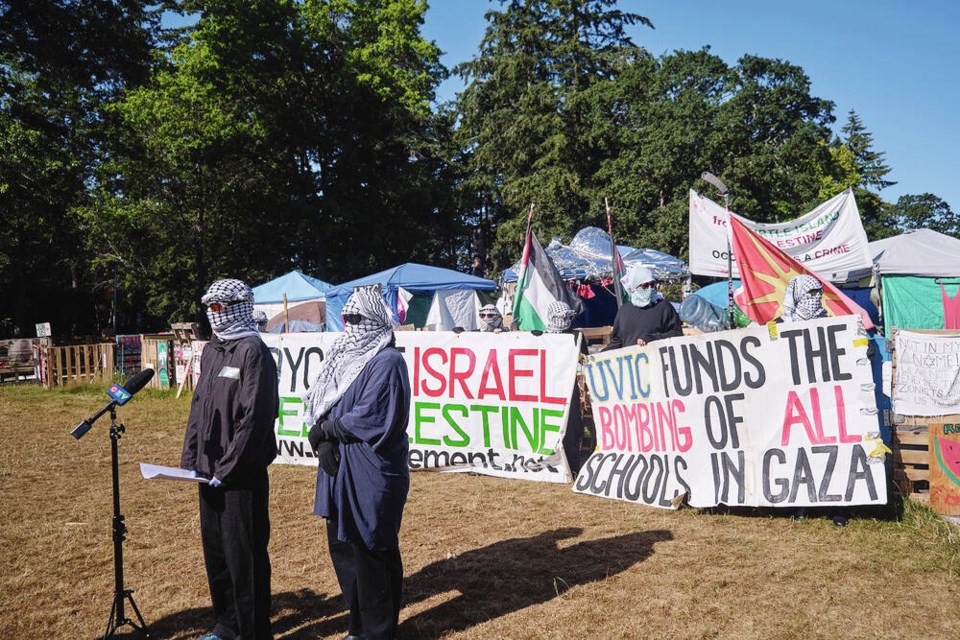Post-secondary institutions on Vancouver Island are hardening their stance towards pro-Palestinian encampments, with both University of Victoria and Vancouver Island University serving trespass notices to protesters.
Protesters camped in front of the UVic library said they were read a trespass advisory by the head of campus security on Saturday and were told they had until Monday 8 a.m. to leave university grounds.
UVic said in a Saturday that talks through an unspecified third-party facilitator have been unsuccessful in negotiating a time and process for the encampment to end peacefully.
“As we see no further prospect for successful dialogue, the university has advised the People’s Park UVic that they are trespassing and asked them to leave university property,” the statement said.
A university spokesperson said students were advised through a “verbal reminder” given at 10 a.m. Saturday.
At a press conference on Friday, masked protesters with the People’s Park said UVic had “refused to make any concrete commitments” to divesting investments in companies that protesters say are involved in violations of international law, human rights and “aid and benefit from genocide.”
Protesters said they presented a third and final version of a “collaboratively edited” agreement to UVic on July 16, but were unexpectedly stonewalled by university administration.
“Instead they demanded that we agree to their previous and insufficient offer, or choose to await uncertain consequences,” one protester said.
Terms of the negotiations have not been made public.
Protesters have been calling for UVic to divest from corporations supporting Israel, cutting academic ties to that country and for UVic to “condemn the ongoing genocide of Palestinians.”
One protester said on Friday that UVic and the encampment have been communicating through third-party mediator that would physically exchange documents between the two parties after UVic pulled out of face-to-face talks in early June.
UVic, which publicly said on June 4 that it would not negotiate with protesters unless they agreed in writing to refrain from disrupting campus operations, did not respond to questions about the negotiations.
UVic philosophy professor Audrey Yap told the Times Colonist that students have worked really hard at the negotiation process. “They’ve really been trying to engage in good faith. They’ve been trying really hard to find a solution.”
“I personally find it really disappointing that the admin[istration] would cease negotiations,” Yap said. “I wish the admin had kept trying … the students were still trying.”
Encampment representatives did not respond to questions from the Times Colonist about whether they intend to remain after the Monday deadline.
In a social media post advertising its regular evening gathering following the pro-Palestinian Saturday rally in downtown Victoria, the encampment asked for its followers to “stay tuned for updates from camp and plans going forward.”
Meanwhile, in Nanaimo, Vancouver Island University served legal documents to its students through a mass email on Friday after receiving permission from a judge to serve defendants via alternate methods.
VIU has filed a notice of civil claim in the 小蓝视频 Supreme Court, seeking an injunction against the camp and damages from the protesters after they did not comply with a trespass notice that requested the encampment be disbanded by July 15.
A preamble in the notice served on Friday asks people not involved with the VIU pro-Palestinian encampment to disregard the email, according to a copy of the document obtained by the Times Colonist.
The encampments at UVic and VIU were established on their respective campuses on May 1 during a wave of similar protests that swept across North America around that time.
The two are among the last remaining encampments in Canada.
A camp at the University of 小蓝视频 in Vancouver was vacated by protesters voluntarily on July 7.
Protesters left a camp at the University of Toronto in early July after an Ontario judge granted an injunction against the demonstrators.
According to University of Ottawa law professor Michael Geist, that decision provided “a road map for other institutions” looking to dislodge their own campus protests.
— With a file from The Canadian Press




